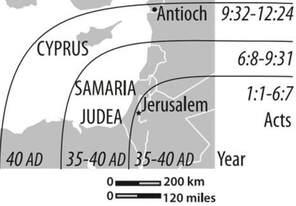|
From my experience and knowledge of persecution in the Western World, there are very few, if any, who understand the degree of suffering Christians go through in other parts of the world. What little we do know, the many who face harsh and brutal treatment, and still remain true to Jesus and their faith in Him, understand the amazing character we see in Paul.
Paul was so hated that Jews from Antioch and Iconium came to Lystra and “persuaded the crowds [to] stone Paul and drag him out of the city, supposing the he was dead” (Acts 14:19). As much as he was hated by the Jews, he was loved more by the disciples he won to Christ. Rather than retreating to a safe place, “the next day he went on with Barnabas to Derbe…preached the gospel…and made many disciples” (14:20-21). Present suffering was not a hindrance to the spread of the gospel. You can be sure that Paul is not trying to make a hero of himself in any way, but is determined to press on “to preach the gospel, not where Christ has already been named” (Romans 15:20). Oh, that this degree of passion would grip our hearts today. When it does, suffering should be to us fellowship with Christ who suffered for us, leaving us a model (Philippians 3:10; 1 Peter 2:21).
0 Comments
What happened in Acts 14:8-18 has features in it that are mimicked today. My mind quickly goes to certain music artists who gain popularity in ‘Christian circles’ and the crowds go wild when they hold concerts. From tee shirts to memorabilia, the hype is all about the artist, but God is left out.
Paul and Barnabas travel from Iconium to Lystra and there find a man crippled from birth. “Paul looking intently at him and seeing that he had faith to be made well, said in a loud voice, “Stand up on your feet.” And he sprang up and began walking.” At this, the crowd went wild and proclaimed, “the gods have come down to us in the likeness of men! (14:9-11). Look at the response to this uproar; “when the apostles Barnabas and Paul heard of it, they tore their garments and rushed out into the crowd, crying out, “Men, why are you doing these things? We also are men, of like nature with you, and we bring you good news, that you should turn from these vain things to a living God” (Acts 14:14–15). Notice two things: 1) The apostles clearly and completely reject personal praise and exaltation. 2) They immediately present their reason for being in Lystra and the purpose for healing of the crippled man. There is a grave danger in any popularity of allowing pride to obscure the reason for ministry and the message of the gospel. Be very careful of this danger in any area of your life. If we are faithful to preach and witness the pure gospel of grace in Jesus Christ, we must expect there will be opposition. First, let’s start with the good news.
“Now at Iconium they entered together into the Jewish synagogue and spoke in such a way that a great number of both Jews and Greeks believed” (Acts 14:1). Paul and Barnabas spoke in such a “manner” that the message of the gospel was received because the Holy Spirit was working through the speakers and in the hearers. This is not because these two men took a class in public speaking or had practiced what to say before going out in public. It was formed in their hearts and lives along with knowing that the Lord was working with them (Mark 16:20). This is confirmed in verse 3. “So, they remained for a long time, speaking boldly for the Lord, who bore witness to the word of His grace, granting signs and wonders to be done by their hands” (Acts 14:3). This is what the disciples prayed for in Acts 4:29-32. It continued to take place. At the same time, “the unbelieving Jews stirred up the Gentiles and poisoned their minds against the brothers.” When the gospel is presented in its purity, we should never be surprised that there will come opposition against it. The risk was high for Paul and Barnabas, but it was worth the great number who were saved. Let the work of God speak for itself so He receives the glory for what is accomplished. NOTE: Please send any comments to [email protected] If we read the Book of Acts too quickly, we will pass over significant details that should instruct us in the way we do missions and the Lord’s work. I had originally intended to jump from the initial relationship between Barnabas and Saul to Paul and Timothy, but there are vital lessons to learn in this journey from Acts 9 to 16.
When the Holy Spirit is allowed to build HIS unity between leaders and workers in ministry (see also Ephesians 4:3), the Spirit makes their work effective in those who receive the gospel and become disciples. Notice how two results go together; “And the disciples were filled with joy and with the Holy Spirit” (Acts 13:52). This was the same result in Thessalonica (1 Thessalonians 1:6). Remember that these evangelizing and church planting efforts were very short. Their time in Antioch of Pisidia was only about five months, yet look at the fruit. What is my point? Unified labor and Spirit filled ministry produces results that is confirmed by the Lord that it is His work. So often mission organizations and churches measure results in the number of converts, churches planted, buildings erected, schools and hospitals built or how much giving has increased. We need to start measuring our ministry by what is going on in hearts and souls. It takes a “Spirit filled” person to measure JOY IN THE LORD!!  Every partnership in ministry will go through times of testing. How we go through these reflects the degree of humility and godly character each individual has developed. If either one of these features is weak or lacking, it will become evident when they face some circumstance that puts their relationship to the test. Barnabas and Saul became the theme of Luke’s account in Acts 13. In this chapter, we see changes taking place. Saul’s name (prayed or asked for) is changed to Paul (small), and is “filled with the Holy Spirit” (13:9) to deliver a powerful message to Elymas at Salamis and then again in Antioch of Pisidia. Paul is now taking a leadership role more than Barnabas; not because he asserted himself, but it was the work of the Holy Spirit. The fruit of this movement was that “the proconsul believed…the people begged that these things might be told them the next Sabbath…the whole city gathered to hear the Word of the Lord…the Gentiles heard this, began rejoicing and glorifying the Word of the Lord” (13:12, 44, 48). When there is the absence of jealousy and concern over position in leadership, humility makes way for God to work because we are unified in His purpose, not our agendas.  That early relationship between Barnabas and Saul was very important to the development and future of Saul’s (Paul’s) ministry. Not only did Barnabas introduce Saul to the leader in Jerusalem, he later looked for Saul at Tarsus to come and work with him at Antioch where the gospel spread and God’s grace was establishing a Gentile church (Acts 11:19-26). “For a whole year they met with the church and taught a great many people” (11:26). You can imagine the spiritual growth in the disciples and both men. They experienced unity in working together. This is proven as they were “worshiping the Lord and fasting, the Holy Spirit said; “Set apart for Me Barnabas and Saul for the work to which I have called them” (13:2). Their partnership had been under the control and development of the Holy Spirit. Now they could be sent out together by Him and the church at Antioch for new harvest fields. Are we seeing this happen today? I would not say that it happens often because it is very rare. It is my conviction that it should take place much more than it does. How do we promote this kind of partnership? There is only one way – let the Holy Spirit work in us individually and connect us with a “like-minded” servant. Will you pray right now for this to happen quickly in your life?  As I was thinking about what God wanted me to write in this blog, my mind went back a few years ago to a retreat where our team met for a couple days and asked the Lord, “what should be our main focus in prayer for the coming year?” We determined that we should pray for “Timothys.” This made me think of the steps that come before we have a faithful “Timothy.” We need “Pauls” that are looking for and developing Timothys. There was another man we cannot forget who came before Paul (Saul); Barnabas. As his name implies, Barnabas was a “son of encouragement” (Acts 4:36). When a new convert named Saul came on the scene, the leaders in Jerusalem “were all afraid of him, for they did not believe that he was a disciple” (9:26) based on Saul’s history. What Saul needed was a man like Barnabas to encourage him and at the same time be respected by the Jerusalem leaders (11:22-24), and speak on behalf of Saul because. Barnabas personally knew what happened at Saul’s conversion (9:27). This was key to what God was going to do. The character of Barnabas is rare in our day, but greatly needed. If we are going to rapidly multiply the work of God, there must be godly men who promote God’s work in potential “Pauls” so they can find and produce “Timothys.” Stay with me on this subject tomorrow. It is a remarkable statement that tells us the kind of character God developed in the man and leader we know as Moses. He made some choices that speak directly to us in our day.
“By faith Moses, when he was grown up, refused to be called the son of Pharaoh’s daughter, choosing rather to be mistreated with the people of God than to enjoy the fleeting pleasures of sin. He considered the reproach of Christ greater wealth than the treasures of Egypt, for he was looking to the reward” (Hebrews 11:24–26). One of the first points we notice in these verses about Moses is who he was willing to identify with. Knowing that he was part of God’s chosen people, it was more important to agree with how God saw him rather than choosing a worldly identification, even though it might have brought him wealth, prestige and a royal title. By this time in his life, Moses realized that his people (Israel) were and would be an oppressed nation. Why would anyone make this choice when it would mean “mistreatment”? Some choices cannot be measured by worldly wealth. Not only that, most measurements of this world’s wealth are very “fleeting or temporary pleasures.” Though Moses did not know it at the time, the reproach of Christ was what he chose, and that meant rewards out of this world. Every day, people are making the same choice. Millions are being persecuted because they identify with Jesus as Savior and Lord. They make that choice knowing His name is worth “mistreatment” and dishonor in the eyes of the world. Their reward is far greater than what this world can give! On Wednesday evenings, I have been leading a group through Paul’s letter to the Philippians. This is one of his seven letters written from prison; most likely the prison or house arrest in Rome. He certainly did not complain about his circumstances in any of these letters.
“I want you to know, brothers, that what has happened to me has really served to advance the gospel, so that it has become known throughout the whole imperial guard and to all the rest that my imprisonment is for Christ” (Philippians 1:12–13). Instead of complaining, Paul is absolutely certain that a prison chains “advance the gospel” and then gives proof of his confidence. The gospel “has become known throughout the whole imperial guard and to all the rest that my imprisonment is for Christ.” You can be sure that Paul used every opportunity to proclaim the gospel to guards, prison workers, and other prisoners. It is not hard to imagine conversations that flowed from his fervent, Spirit-filled, powerful and passionate presentation of Jesus Christ as Lord and Savior. It probably even got to the ears of Nero. No wonder Paul could say that his “imprisonment is for Christ.” There is a lot of complaining during these days of COVID-19. The question I have for all of us is; what are you doing to “advance the gospel”? If you are not thinking like that, you should! God never wants us to waste difficult circumstances, but find out how they can be used to further His work. As I did yesterday, I am going to use the reference in Mark 1:15 as the basis of this blog; “The time is fulfilled and the kingdom of God is at hand; repent and believe in the gospel.”
The word “believe” or “faith” can be explained as “extending complete trust or reliance” on something outside yourself with “confidence,” adding nothing else to that trust. Jesus compares this belief to “little ones who believe in Me” (Matthew 18:6). This is simple trust that does not require intellectual reasoning or adding something we have to make it work. Early in the Church, there were some who wanted to add requirements (works) to the gospel in order for the Gentiles to join the Church. Peter, Barnabas and Paul stood in opposition to this idea because it went against the very definition of “faith” (Acts 15:1-21; Galatians 2:15-16). If anything is added to faith or simple trust (belief) in Jesus for salvation by grace alone, then that message has become a “different gospel, not that there is another.” (Galatians 1:6). We must be very careful today that we do not allow other voices (teachings) into our lives or churches that do not stand on the pure gospel, and therefore deceive those who are not anchored in the gospel of grace by faith (Ephesians 2:1-10). |
Archives
June 2024
Link To Our Old Blog:
|

 RSS Feed
RSS Feed